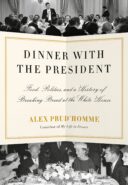
Some of the most significant moments in American history have occurred over meals, as U.S. presidents broke bread with friends or foe: Thomas Jefferson’s nationbuilding receptions in the new capital, Washington, D.C.; Ulysses S. Grant’s state dinner for the king of Hawaii; Teddy Roosevelt’s groundbreaking supper with Booker T. Washington; Richard Nixon’s practiced use of chopsticks to pry open China; Jimmy Carter’s cakes and pies that fueled a détente between Israel and Egypt at Camp David.
Here Alex Prud’homme invites readers into the White House kitchen to reveal the sometimes curious tastes of twenty-six of America’s most influential presidents, how their meals were prepared and by whom, and the ways their choices affected food policy around the world. And the White House menu grew over time— from simple eggs and black coffee for Abraham Lincoln during the Civil War and celebratory turtle soup after and squirrel stew for Dwight Eisenhower, to jelly beans and enchiladas for Ronald Reagan and arugula for Barack Obama. What our leaders say about food touches on everything from our nation’s shifting diet and local politics to global trade, science, religion, war, class, gender, race, and so much more.
Prud’homme also details overlooked figures, like George Washington’s enslaved chef, Hercules Posey, whose meals burnished the president’s reputation before the cook narrowly escaped to freedom, and pioneering First Ladies, such as Dolley Madison and Jackie Kennedy, who used food and entertaining to build political and social relationships. As he weaves these stories together, Prud’homme shows that food is not just fuel when it is served to the most powerful people in the world. It is a tool of communication, a lever of power and persuasion, a form of entertainment, and a symbol of the nation.